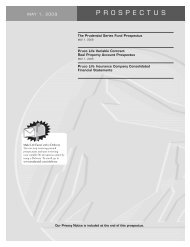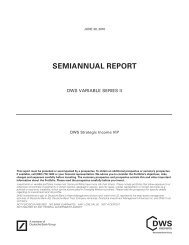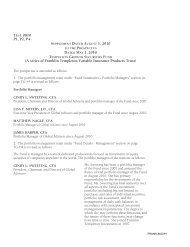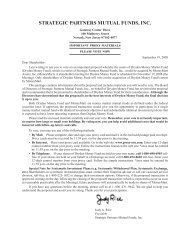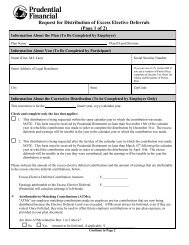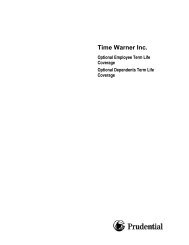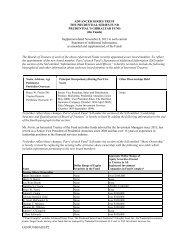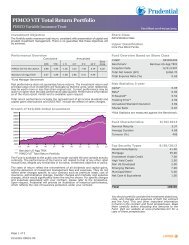ERISA Requirements ERISA (the “Employee <strong>Retirement</strong> Income Security Act of 1974”) and the Code prevent a fiduciary and other “parties in interest” with respect to a plan (and, for these purposes, an IRA would also constitute a “plan”) from receiving any benefit from any party dealing with the plan, as a result of the sale of the contract. Administrative exemptions under ERISA generally permit the sale of insurance/annuity products to plans, provided that certain information is disclosed to the person purchasing the contract. This information has to do primarily with the fees, charges, discounts and other costs related to the contract, as well as any commissions paid to any agent selling the contract. Information about any applicable fees, charges, discounts, penalties or adjustments may be found in the applicable sections of this prospectus. Information about sales representatives and commissions may be found in the sections of this prospectus addressing distribution of the <strong>Annuities</strong>. Other relevant information required by the exemptions is contained in the contract and accompanying documentation. Please consult with your tax advisor if you have any questions about ERISA and these disclosure requirements. Spousal Consent Rules for <strong>Retirement</strong> Plans – Qualified Contracts If you are married at the time your payments commence, you may be required by federal law to choose an income option that provides survivor annuity income to your spouse, unless your spouse waives that right. Similarly, if you are married at the time of your death, federal law may require all or a portion of the Death Benefit to be paid to your spouse, even if you designated someone else as your Beneficiary. A brief explanation of the applicable rules follows. For more information, consult the terms of your retirement arrangement. Defined Benefit Plans and Money Purchase Pension Plans. If you are married at the time your payments commence, federal law requires that benefits be paid to you in the form of a “qualified joint and survivor annuity” (QJSA), unless you and your spouse waive that right, in writing. Generally, this means that you will receive a reduced payment during your life and, upon your death, your spouse will receive at least one-half of what you were receiving for life. You may elect to receive another income option if your spouse consents to the election and waives his or her right to receive the QJSA. If your spouse consents to the alternative form of payment, your spouse may not receive any benefits from the plan upon your death. Federal law also requires that the plan pay a Death Benefit to your spouse if you are married and die before you begin receiving your benefit. This benefit must be available in the form of an annuity for your spouse's lifetime and is called a “qualified pre-retirement survivor annuity” (QPSA). If the plan pays Death Benefits to other Beneficiaries, you may elect to have a Beneficiary other than your spouse receive the Death Benefit, but only if your spouse consents to the election and waives his or her right to receive the QPSA. If your spouse consents to the alternate Beneficiary, your spouse will receive no benefits from the plan upon your death. Any QPSA waiver prior to your attaining age 35 will become null and void on the first day of the calendar year in which you attain age 35, if still employed. Defined Contribution Plans (including 401(k) Plans and ERISA 403(b) <strong>Annuities</strong>). Spousal consent to a distribution is generally not required. Upon your death, your spouse will receive the entire Death Benefit, even if you designated someone else as your Beneficiary, unless your spouse consents in writing to waive this right. Also, if you are married and elect an annuity as a periodic income option, federal law requires that you receive a QJSA (as described above), unless you and your spouse consent to waive this right. IRAs, non-ERISA 403(b) <strong>Annuities</strong>, and 457 Plans. Spousal consent to a distribution usually is not required. Upon your death, any Death Benefit will be paid to your designated Beneficiary. Gifts and Generation-skipping Transfers If you transfer your contract to another person for less than adequate consideration, there may be gift tax consequences in addition to income tax consequences. Also, if you transfer your contract to a person two or more generations younger than you (such as a grandchild or grandniece) or to a person that is more than 37 1 ⁄2 years younger than you, there may be generation-skipping transfer tax consequences. Additional Information For additional information about federal tax law requirements applicable to IRAs and Roth IRAs, see the IRA Disclosure Statement or Roth IRA Disclosure Statement, as applicable. 122
OTHER INFORMATION PRUCO LIFE AND THE SEPARATE ACCOUNT Pruco Life. Pruco Life Insurance Company (Pruco Life) is a stock life insurance company organized in 1971 under the laws of the State of Arizona. It is licensed to sell life insurance and annuities in the District of Columbia, Guam and in all states except New York. Pruco Life is a wholly-owned subsidiary of The <strong>Prudential</strong> Insurance Company of America (<strong>Prudential</strong>), a New Jersey stock life insurance company that has been doing business since 1875. <strong>Prudential</strong> is an indirect wholly-owned subsidiary of <strong>Prudential</strong> Financial, Inc. (<strong>Prudential</strong> Financial), a New Jersey insurance holding company. No company other than Pruco Life has any legal responsibility to pay amounts that it owes under its annuity contracts. Among other things, this means that where you participate in an optional living benefit or death benefit and the value of that benefit (e.g., the Protected Withdrawal Value for Highest Daily Lifetime Income 2.0) exceeds your current Account Value, you would rely solely on the ability of Pruco Life to make payments under the benefit out of its own assets. As Pruco Life's ultimate parent, <strong>Prudential</strong> Financial, however, exercises significant influence over the operations and capital structure of Pruco Life. Pruco Life incorporates by reference into the prospectus its latest annual report on Form 10-K filed pursuant to Section 13(a) or Section 15(d) of the Securities Exchange Act of 1934 (Exchange Act) since the end of the fiscal year covered by its latest annual report. In addition, all documents subsequently filed by Pruco Life pursuant to Sections 13(a), 13(c), 14 or 15(d) of the Exchange Act also are incorporated into the prospectus by reference. Pruco Life will provide to each person, including any beneficial Owner, to whom a prospectus is delivered, a copy of any or all of the information that has been incorporated by reference into the prospectus but not delivered with the prospectus. Such information will be provided upon written or oral request at no cost to the requester by writing to Pruco Life Insurance Company, One Corporate Drive, Shelton, CT 06484 or by calling 800-752-6342. Pruco Life files periodic reports as required under the Exchange Act. The public may read and copy any materials that Pruco Life files with the SEC at the SEC's Public Reference Room at 100 F Street, N.E., Washington, D.C. 20549. The public may obtain information on the operation of the Public Reference Room by calling the SEC at 202-551-8090. The SEC maintains an Internet site that contains reports, proxy, and information statements, and other information regarding issuers that file electronically with the SEC (see http://www.sec.gov). Our internet address is http://www.prudentialannuities.com. Pruco Life conducts the bulk of its operations through staff employed by it or by affiliated companies within the <strong>Prudential</strong> Financial family. Certain discrete functions have been delegated to non-affiliates that could be deemed “service providers” or “administrators” under the Investment Company Act of 1940. The entities engaged by Pruco Life may change over time. As of December 31, 2011, non-affiliated entities that could be deemed service providers to Pruco Life and/or another insurer within the <strong>Prudential</strong> <strong>Annuities</strong> business unit consisted of the following: Alliance-One Services Inc. (administration of variable life policies) located at 55 Hartland Street, East Hartford CT 06108, Ascensus (qualified plan administrator) located at 200 Dryden Road, Dresher, PA 19025, Alerus <strong>Retirement</strong> Solutions (qualified plan administrator), State Street Financial Center One, Lincoln Street, Boston, MA 02111, Aprimo (fulfillment of marketing materials), 510 East 96 th Street, Suite 300, Indianapolis, IN 46240, Aplifi (order entry systems provider) located at 555 SW 12th Ave, Suite 202, Pompano Beach, FL 33069, Broadridge Investor Communication Solutions, Inc. (proxy tabulation services), 51 Mercedes Way, Edgewood, NY 11717, Consona (maintenance and storage of administrative documents), 333 Allegheny Avenue, Suite 301 North, Oakmont, PA 15139-2066, Depository Trust & Clearing Corporation (clearing and settlement services), 55 Water Street, 26 th Floor, New York, NY 10041, DG3 North America, Inc. (proxy and prospectus printing and mailing services), 100 Burma Road, Jersey City, NJ 07305, DST Systems, Inc. (clearing and settlement services), 4900 Main, 7 th Floor, Kansas City, MO 64112, EBIX, Inc. (order-entry system), 5 Concourse Parkway, Suite 3200, Atlanta, GA 30328, ExlService Holdings, Inc., (administration of annuity contracts), 350 Park Avenue, 10th Floor, New York, NY 10022, Diversified Information Technologies Inc. (records management), 123 Wyoming Avenue, Scranton, PA 18503, Fiserv (composition, printing and mailing of confirmation and quarterly statements), 881 Main Street, Manchester, CT 06040, Fosdick Fulfillment Corp. (fulfillment of prospectuses and marketing materials), 26 Barnes Industrial Park Road, North Wallingford, CT 06492, Insurance Technologies (annuity illustrations), 38120 Amrhein Ave., Livonia, MI 48150, Morningstar Associates LLC (asset allocation recommendations) , 225 West Wacker Drive Chicago, IL 60606, National Financial Services (clearing and settlement services), NEPS, LLC (composition, printing, and mailing of contracts and benefit documents), 12 Manor Parkway, Salem, NJ 03079, Pershing LLC (order-entry systems provider), One Pershing Plaza, Jersey City, NJ 07399, RR Donnelley Receivables, Inc. (printing annual reports and prospectuses), 111 South Wacker Drive, Chicago, IL 60606-4301, Skywire Software (composition, printing, and mailing of contracts and benefit documents), 150 Post Street, Suite 500, San Francisco, CA 94108, VG Reed & Sons, Inc. (printing and fulfillment of annual reports), 1002 South 12th Street, Louisville, KY 40210, William B. Meyer (printing and fulfillment of prospectuses and marketing materials), 255 Long Beach Boulevard, Stratford, CT 06615, Right Now Technologies (business information repository), 136 Enterprise Blvd, Bozeman, MT 59718, The Harty Press (print vendor for client communications) 25 James Street, New Haven, CT 06513. The Separate Account. We have established a Separate Account, the Pruco Life Flexible Premium <strong>Variable</strong> Annuity Account (Separate Account), to hold the assets that are associated with the variable annuity contracts. The Separate Account was established under Arizona law on June 16, 1995, and is registered with the SEC under the Investment Company Act of 1940 as a unit investment trust, which is a type of investment company. The assets of the Separate Account are held in the name of Pruco Life and legally belong to us. These assets are kept separate from all of our other assets and may not be charged with liabilities arising 123
- Page 1 and 2:
PRUCO LIFE INSURANCE COMPANY PRUCO
- Page 3 and 4:
UNDERLYING PORTFOLIO UNDERLYING MUT
- Page 5 and 6:
UNDERLYING PORTFOLIO UNDERLYING MUT
- Page 7 and 8:
ii. To the list of available variab
- Page 9 and 10:
II. NEW OPTIONAL BENEFITS This supp
- Page 11 and 12:
that may periodically transfer your
- Page 13 and 14:
Anniversary, we identify the Unadju
- Page 15 and 16:
Non-Lifetime Withdrawal Feature You
- Page 17 and 18:
▪ If annuity payments are to begi
- Page 19 and 20:
(iv) our receipt of Due Proof of De
- Page 21 and 22:
Example (assume the income basis is
- Page 23 and 24:
taken first from your own Account V
- Page 25 and 26:
While Spousal Highest Daily Lifetim
- Page 27 and 28:
** In this example, the first daily
- Page 29 and 30:
▪ Any Lifetime Withdrawal that yo
- Page 31 and 32:
to the death claim and the payment
- Page 33 and 34:
ages 59 1 ⁄2 to 64; 4.5% for ages
- Page 35 and 36:
Example of proportional reductions
- Page 37 and 38:
In general, withdrawals made from t
- Page 39 and 40:
certain in order to comply with the
- Page 41 and 42:
Upon termination of Highest Daily L
- Page 43 and 44:
Key Feature - Annual Income Amount
- Page 45 and 46:
Example of dollar-for-dollar reduct
- Page 47 and 48:
Highest Daily Death Benefit A Death
- Page 49 and 50:
newly-elected benefit will commence
- Page 51 and 52:
How Spousal Highest Daily Lifetime
- Page 53 and 54:
[THIS PAGE INTENTIONALLY LEFT BLANK
- Page 55 and 56:
[THIS PAGE INTENTIONALLY LEFT BLANK
- Page 57 and 58:
[THIS PAGE INTENTIONALLY LEFT BLANK
- Page 60 and 61:
The Prudential Insurance Company of
- Page 62 and 63:
COMBOSUP2 ADVANCED SERIES TRUST Sup
- Page 64 and 65:
Subadvisers Investment Categories a
- Page 66 and 67:
STYLE/ TYPE Asset Allocation COMBOS
- Page 68 and 69:
GENPROD2 PRUCO LIFE INSURANCE COMPA
- Page 70 and 71:
PRUCO LIFE INSURANCE COMPANY PRUCO
- Page 72 and 73:
In the section titled “Investment
- Page 74 and 75:
PRUCO LIFE INSURANCE COMPANY PRUCO
- Page 76 and 77:
Advanced Series Trust AST Academic
- Page 78 and 79:
DEATH BENEFITS ....................
- Page 80 and 81:
Guarantee Period: The period of tim
- Page 82 and 83:
C SERIES There is no CDSC or other
- Page 84 and 85:
OPTIONAL BENEFIT ANNUALIZED OPTIONA
- Page 86 and 87:
OPTIONAL BENEFIT ANNUALIZED OPTIONA
- Page 88 and 89:
UNDERLYING PORTFOLIO UNDERLYING MUT
- Page 90 and 91:
EXPENSE EXAMPLES These examples are
- Page 92 and 93:
Please see “Investment Options,
- Page 94 and 95:
INVESTMENT OPTIONS The Investment O
- Page 96 and 97:
INVESTMENT OBJECTIVES/POLICIES ADVA
- Page 98 and 99:
INVESTMENT OBJECTIVES/POLICIES AST
- Page 100 and 101:
INVESTMENT OBJECTIVES/POLICIES AST
- Page 102 and 103:
INVESTMENT OBJECTIVES/POLICIES AST
- Page 104 and 105:
INVESTMENT OBJECTIVES/POLICIES AST
- Page 106 and 107:
INVESTMENT OBJECTIVES/POLICIES AST
- Page 108 and 109:
group (Group II) our “Custom Port
- Page 110 and 111:
For the Long-Term MVA Option, a Gua
- Page 112 and 113:
FEES, CHARGES AND DEDUCTIONS In thi
- Page 114 and 115:
Settlement Service Charge: If your
- Page 116 and 117:
additional Purchase Payments, unles
- Page 118 and 119:
Please note the following additiona
- Page 120 and 121:
MANAGING YOUR ACCOUNT VALUE There a
- Page 122 and 123:
Please Note: Contracts managed by y
- Page 124 and 125:
ACCESS TO ACCOUNT VALUE TYPES OF DI
- Page 126 and 127:
prior to age 59 1 ⁄2 if you elect
- Page 128 and 129:
ANNUITY OPTIONS Annuitization invol
- Page 130 and 131:
LIVING BENEFITS Pruco Life offers d
- Page 132 and 133:
Income 2.0 may be appropriate if yo
- Page 134 and 135:
subsequent Purchase Payments and wi
- Page 136 and 137:
make will be the first Lifetime Wit
- Page 138 and 139:
certain in order to comply with the
- Page 140 and 141:
transfer all amounts held in the AS
- Page 142 and 143:
Example: Assuming the Target Ratio
- Page 144 and 145:
If you elect Highest Daily Lifetime
- Page 146 and 147:
If the Annuity permits additional P
- Page 148 and 149:
If you have not made a Lifetime Wit
- Page 150 and 151: ▪ Spousal Highest Daily Lifetime
- Page 152 and 153: Required Minimum Distributions See
- Page 154 and 155: ▪ One Annuity Owner, where the Ow
- Page 156 and 157: effective date of the benefit, the
- Page 158 and 159: Highest Daily Lifetime Income 2.0 w
- Page 160 and 161: ▪ The Annuitant was 70 years old
- Page 162 and 163: ▪ Please note that if your Unadju
- Page 164 and 165: The benefit automatically terminate
- Page 166 and 167: (c) all Purchase Payments (includin
- Page 168 and 169: ▪ Both designated lives were 70 y
- Page 170 and 171: Required Minimum Distributions See
- Page 172 and 173: newly-elected benefit will commence
- Page 174 and 175: GUARANTEED RETURN OPTION PLUS II (G
- Page 176 and 177: time. The formula determines the ap
- Page 178 and 179: Value” above for more details). Y
- Page 180 and 181: HD GRO II uses a predetermined math
- Page 182 and 183: Any amounts invested in the AST bon
- Page 184 and 185: DEATH BENEFITS TRIGGERS FOR PAYMENT
- Page 186 and 187: Calculation of Highest Anniversary
- Page 188 and 189: A surviving spouse’s ability to c
- Page 190 and 191: VALUING YOUR INVESTMENT VALUING THE
- Page 192 and 193: TAX CONSIDERATIONS The tax consider
- Page 194 and 195: Taxes Payable by Beneficiaries The
- Page 196 and 197: A Nonqualified annuity may also be
- Page 198 and 199: In any event, you must begin receiv
- Page 202 and 203: out of any other business we may co
- Page 204 and 205: Cost Averaging, auto rebalancing, a
- Page 206 and 207: Infinex Investments, Inc. ING Finan
- Page 208 and 209: County, Illinois, was served on Pru
- Page 210 and 211: [THIS PAGE INTENTIONALLY LEFT BLANK
- Page 212 and 213: Sub-Accounts Accumulation Unit Valu
- Page 214 and 215: Sub-Accounts Accumulation Unit Valu
- Page 216 and 217: Sub-Accounts Accumulation Unit Valu
- Page 218 and 219: Sub-Accounts Accumulation Unit Valu
- Page 220 and 221: Sub-Accounts Accumulation Unit Valu
- Page 222 and 223: Sub-Accounts Accumulation Unit Valu
- Page 224 and 225: Sub-Accounts Accumulation Unit Valu
- Page 226 and 227: Sub-Accounts Accumulation Unit Valu
- Page 228 and 229: Sub-Accounts Accumulation Unit Valu
- Page 230 and 231: PREMIER RETIREMENT L SERIES Pruco L
- Page 232 and 233: Sub-Accounts Accumulation Unit Valu
- Page 234 and 235: Sub-Accounts PREMIER RETIREMENT C S
- Page 236 and 237: Sub-Accounts Accumulation Unit Valu
- Page 238 and 239: Sub-Accounts Accumulation Unit Valu
- Page 240 and 241: Sub-Accounts Accumulation Unit Valu
- Page 242 and 243: [THIS PAGE INTENTIONALLY LEFT BLANK
- Page 244 and 245: Annuity Comparison X Series B Serie
- Page 246 and 247: The shaded values indicate the high
- Page 248 and 249: [THIS PAGE INTENTIONALLY LEFT BLANK
- Page 250 and 251:
holidays), plus the amount of any P
- Page 252 and 253:
Examples of dollar-for-dollar and p
- Page 254 and 255:
Required Minimum Distributions Requ
- Page 256 and 257:
Unadjusted Account Value and Protec
- Page 258 and 259:
equire a transfer to the Bond Sub-a
- Page 260 and 261:
to as the “LIA Amount”) if you
- Page 262 and 263:
the latter scenario, we determine w
- Page 264 and 265:
The “Periodic Value” is initial
- Page 266 and 267:
Amount on a dollar-for-dollar basis
- Page 268 and 269:
Here is the calculation: Withdrawal
- Page 270 and 271:
Election of and Designations under
- Page 272 and 273:
[THIS PAGE INTENTIONALLY LEFT BLANK
- Page 274 and 275:
holidays), plus the amount of any P
- Page 276 and 277:
Examples of dollar-for-dollar and p
- Page 278 and 279:
Required Minimum Distributions Requ
- Page 280 and 281:
▪ If you elect this benefit and i
- Page 282 and 283:
Generally, the formula, which is ap
- Page 284 and 285:
Additional Tax Considerations If yo
- Page 286 and 287:
LIA Amount after the first Lifetime
- Page 288 and 289:
section above entitled “How Highe
- Page 290 and 291:
Highest Daily Auto Step-Up An autom
- Page 292 and 293:
Non-Lifetime Withdrawal Feature You
- Page 294 and 295:
apply to current participants in th
- Page 296 and 297:
[THIS PAGE INTENTIONALLY LEFT BLANK
- Page 298 and 299:
If the formula ratio is less than a
- Page 300 and 301:
[THIS PAGE INTENTIONALLY LEFT BLANK
- Page 302 and 303:
We reserve the right to waive the l
- Page 304 and 305:
[THIS PAGE INTENTIONALLY LEFT BLANK
- Page 306 and 307:
If the formula ratio is less than a
- Page 308 and 309:
[THIS PAGE INTENTIONALLY LEFT BLANK
- Page 310 and 311:
▪ T - the amount of a transfer in
- Page 312 and 313:
[THIS PAGE INTENTIONALLY LEFT BLANK
- Page 314 and 315:
You can have a traditional IRA whet
- Page 316 and 317:
2. Rollovers from an employer retir
- Page 318 and 319:
Distributions from traditional IRAs
- Page 320 and 321:
[THIS PAGE INTENTIONALLY LEFT BLANK
- Page 322 and 323:
income, and dividend income), pensi
- Page 324 and 325:
c. Made to a Beneficiary or to your
- Page 326 and 327:
[THIS PAGE INTENTIONALLY LEFT BLANK
- Page 328 and 329:
CONTINGENT DEFERRED SALES CHARGE 1
- Page 330 and 331:
[THIS PAGE INTENTIONALLY LEFT BLANK
- Page 332:
The Prudential Insurance Company of




